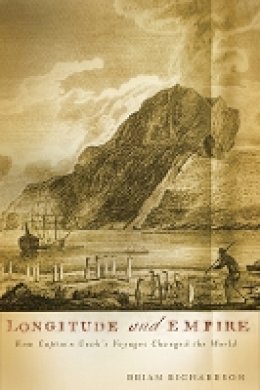
Longitude and Empire: How Captain Cook´s Voyages Changed the World
Brian W. Richardson
Before Captain Cook’s three voyages, to Europeans the globe was uncertain and dangerous; after, it was comprehensible and ordered. Written as a conceptual field guide to the voyages, Longitude and Empire offers a significant rereading of both the expeditions and modern political philosophy. More than any other work, printed accounts of the voyages marked the shift from early modern to modern ways of looking at the world. The globe was no longer divided between Europeans and savages but populated instead by an almost overwhelming variety of national identities.
Cook’s voyages took the fragmented and obscure global descriptions available at the time and consolidated them into a single, comprehensive textual vision. Locations became fixed on the map and the people, animals, plants, and artifacts associated with them were identified, collected, understood, and assimilated into a world order. This fascinating account offers a new understanding of Captain Cook’s voyages and how they affected the European world view.
Product Details
About Brian W. Richardson
Reviews for Longitude and Empire: How Captain Cook´s Voyages Changed the World
John Gascoigne
Journal of Pacific History, Fall 2005
Richardson gives a clear and readable narrative about the importance of the concept of space and its relationship to people in Cook’s narratives and the influence this concept had on British perceptions of the world. The relationship between theory-driven and empirically-motivated political thought in the aftermath of Cook’s voyages is particularly clear and interesting.
Margaret Small
Journal for Maritime Research
Employing only minimal jargon and offering clear ... explanations, Richardson analyses the text of Cook’s Voyages and interprets their impact upon the European mind and political order in a manner that might profitably be emulated by cultural theorists and literary deconstructionists ... Anthropologists such as Anne Salmond and Greg Dening have provided studies of early contacts between Pacific Natives and European largely from the former’s point of view. Richardson’s thought-provoking study reverses the lens to show the impact upon European sensibilities and growing conception of the world as a unified and precisely definable whole.
Merrill Distad, University of Alberta
Bulletin of Pacific Affairs, no. 14
A key contribution of this book is a proper examination of the ways in which Cook’s geographical thinking came to shape how we think historically and ethnographically about the whole world.
Katrina Schlunke, University of Techonology Sydney
Australian Historical Studies, No. 128
